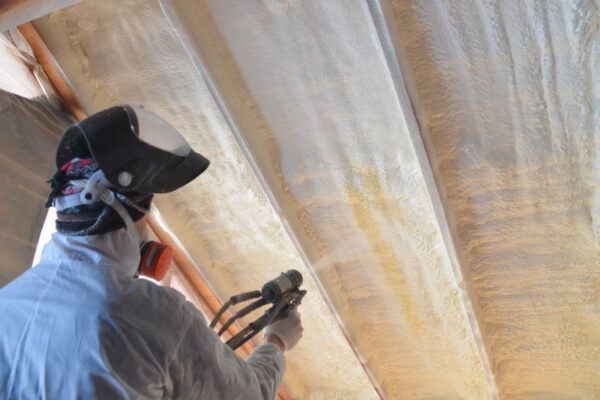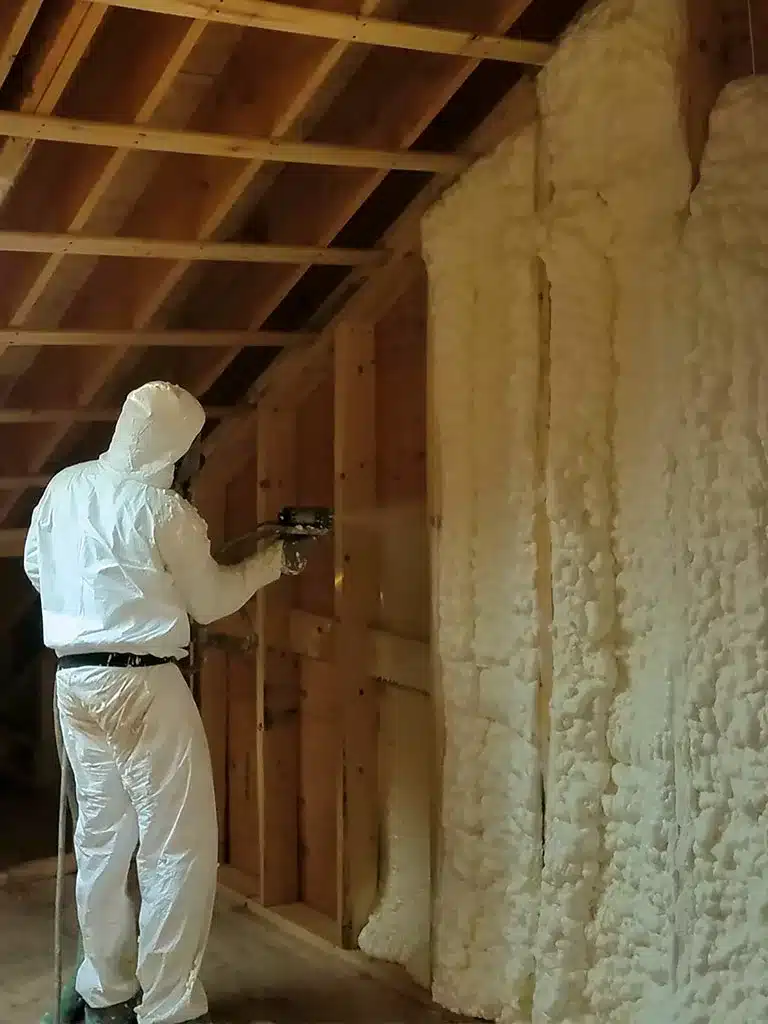Contrasting Spray Foam to Typical Insulation: Which Is Much better?
Contrasting Spray Foam to Typical Insulation: Which Is Much better?
Blog Article
Spray Foam: The Ultimate Service for Air Sealing and Insulation
Spray foam insulation has actually emerged as a leading remedy for efficient air sealing and thermal insulation, using a distinct mix of buildings that set it apart from typical techniques. Recognizing the full extent of its benefits, installment processes, and comparisons with various other insulation types is critical for making informed decisions.
What Is Spray Foam?
Spray foam is a functional insulation material that integrates the principles of air sealing and thermal resistance to boost energy effectiveness in structures. Composed mostly of polyurethane or various other similar compounds, spray foam is used as a fluid that expands upon contact with surface areas, developing a solid, constant layer of insulation. This one-of-a-kind building allows it to load voids, cracks, and spaces that typical insulation products may neglect, supplying a premium air seal.
There are 2 main sorts of spray foam: open-cell and closed-cell. Open-cell spray foam is lighter and a lot more adaptable, supplying excellent sound absorption and a lower R-value per inch - Spray Foam. On the other hand, closed-cell spray foam is denser, supplying a greater R-value, dampness resistance, and included architectural honesty to constructing parts
The application procedure generally involves specialized equipment, guaranteeing a seamless application that follows various substrates, including concrete, metal, and wood. This adaptability makes spray foam suitable for both brand-new constructions and retrofitting existing frameworks. Its capacity to develop a closed barrier substantially adds to decreasing energy intake and boosting interior air high quality, thus making it a preferred selection amongst contractors and property owners alike.
Advantages of Spray Foam Insulation
One of the most substantial advantages of spray foam insulation is its extraordinary ability to develop a constant air obstacle, which successfully reduces power loss. Unlike conventional insulation products, spray foam increases to fill up cracks and spaces, ensuring that air leak is considerably reduced. This particular not only improves power effectiveness yet likewise brings about reduce energy bills gradually.
Additionally, spray foam insulation supplies premium thermal resistance, adding to an extra stable indoor setting. Its high R-value per inch enables efficient insulation in constrained spaces, making it optimal for attic rooms, walls, and crawl spaces. Moreover, the moisture-resistant residential properties of spray foam aid avoid mold and mildew and mold development, promoting healthier living conditions.
An additional crucial benefit of spray foam insulation is its sound-dampening high qualities (Spray Foam). It successfully lowers sound transmission in between areas, creating a quieter and extra comfortable home atmosphere. The resilience of spray foam likewise attracts attention, as it does not sag or settle with time, keeping its efficiency throughout its life-span
Exactly How Spray Foam Works
Comprehending how spray foam insulation works is important for appreciating its effectiveness in air sealing and thermal resistance. Spray foam insulation includes 2 key elements: isocyanate and polyol resin. When these components are mixed, they undertake a chemical response that triggers the material to expand swiftly, developing a dense foam that fills fractures, gaps, and dental caries.
As the foam increases, it follows surface areas, developing an airtight seal that significantly minimizes air infiltration. This particular makes spray foam insulation highly reliable at stopping drafts and moisture infiltration, which can result in power loss and damage with time. Furthermore, the closed-cell version of spray foam provides superior thermal resistance because of its rigid structure, properly lessening warmth transfer.
The distinct residential or commercial properties of spray foam permit it to adhere to uneven surfaces, guaranteeing thorough coverage and a smooth obstacle. Therefore, spray foam insulation not only improves power efficiency however additionally contributes to enhanced interior air top quality by reducing the build-up of irritants and toxins. Eventually, recognizing the mechanics behind spray foam underscores its function as a remarkable choice for insulation and air securing in both industrial and residential applications.
Installment Refine Introduction

Before installation, the space should be effectively cleansed and prepped, ensuring that surfaces are without wetness, debris, and dust. Due to the fact that impurities can jeopardize bond and general performance, this action is critical. As soon as the location is prepared, the application includes mixing the 2 parts of the spray foam, which increases upon get in touch with and fills gaps properly.
Educated experts ought to conduct the installment, using specialized equipment to make certain uniform coverage and optimum density. Safety preventative measures, consisting of wearing protective gear and making certain appropriate ventilation, are important throughout this process. After application, the foam generally treatments rapidly, forming a strong obstacle that improves power effectiveness.
Contrasting Spray Foam to Standard Insulation
When assessing insulation alternatives, spray foam insulation sticks out in comparison to standard products such as fiberglass and cellulose. One of the key benefits of spray foam is its superior air sealing abilities. Unlike fiberglass and cellulose, which can allow air infiltration, spray foam expands upon application, filling gaps and holes to create official website a closed seal. This causes boosted energy effectiveness, as much less heated or cooled air runs away the home, resulting in lower energy costs.
Furthermore, spray foam supplies a greater R-value per inch than typical insulation kinds, offering more effective thermal resistance in a thinner profile. This characteristic is especially valuable precede with limited tooth cavity depth. Moreover, spray foam is immune to dampness and mold and mildew development, which can be a substantial interest in cellulose and fiberglass, specifically in moist settings.
However, spray foam insulation generally carries a greater ahead of time price than its standard counterparts. Property owners must weigh this first financial investment against long-term power financial savings and efficiency benefits. Ultimately, while both insulation kinds serve their purpose, spray foam becomes a much more advanced solution for modern-day insulation requirements, particularly in regards to air sealing and thermal efficiency.

Verdict
In recap, spray foam insulation represents an extremely efficient remedy for attaining optimal air sealing and thermal resistance. Its distinct buildings, including moisture resistance and sound dampening, make it look at this web-site suitable for various applications in both brand-new buildings and retrofitting jobs (Spray Foam). Although the first costs may be greater contrasted to conventional insulation materials, the long-term benefits, such as considerable energy savings and enhanced interior air high quality, validate the investment and highlight its value in modern structure techniques.
Spray foam insulation has actually emerged as a leading solution for reliable air sealing and thermal insulation, providing an unique mix of properties that establish it apart from conventional methods.Spray foam is a functional insulation material that combines the concepts of air sealing and thermal resistance to boost energy performance in structures.When evaluating insulation alternatives, spray foam insulation stands out in comparison to More Bonuses traditional products such as fiberglass and cellulose. Ultimately, while both insulation kinds serve their function, spray foam emerges as a much more advanced option for modern insulation demands, particularly in terms of air securing and thermal efficiency.
In recap, spray foam insulation stands for an extremely reliable service for attaining optimal air securing and thermal resistance.
Report this page